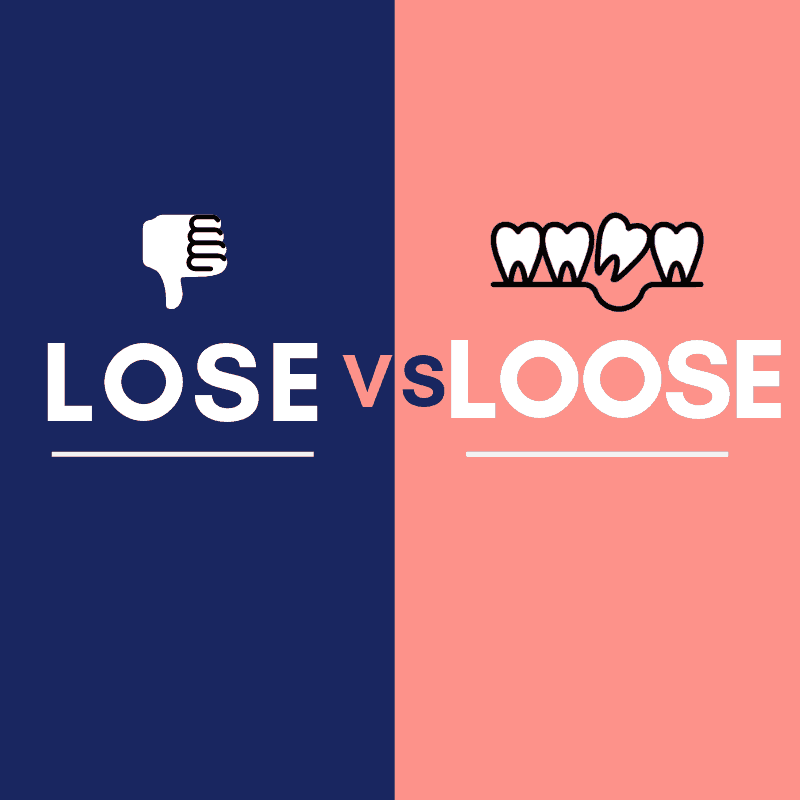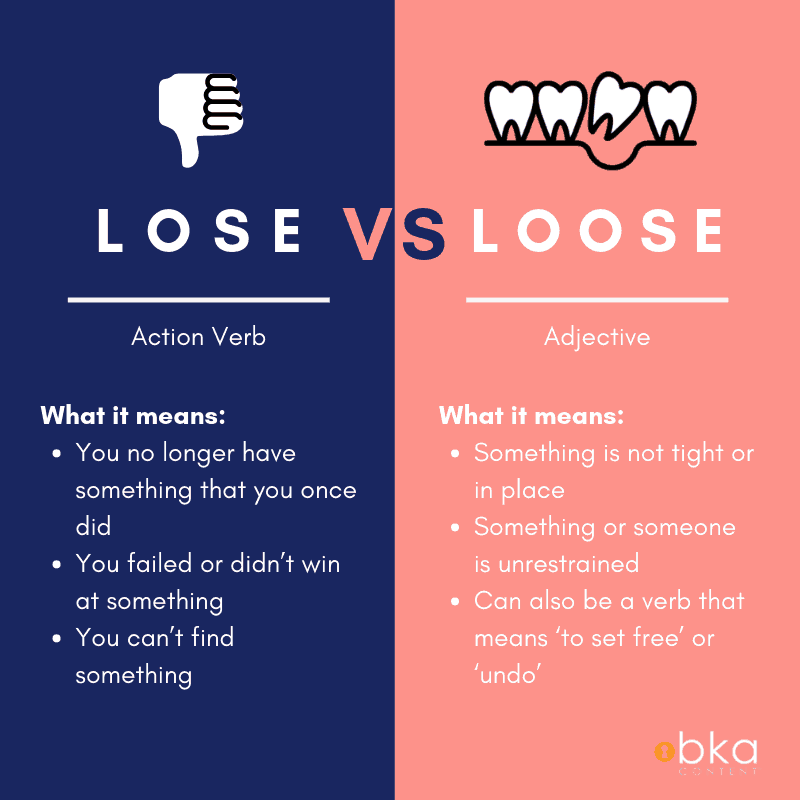
Commonly Confused Words: Lose vs. Loose

What a difference a letter makes. Change a k to an h, and a sweet goodnight kiss becomes a terrifying goodnight hiss (not to mention the Worst. Date. Ever). Add an s to the front of “laughter,” and giggles get violent. Fortunately, when it comes to lose vs. loose, the changes that one little o can make aren’t quite as sinister.
They can still wreak havoc on your writing, though. Read on to learn more about the difference between lose and loose, when to use each, and how a quick sound check can tell you if you’ve chosen the correct word.
What’s the Difference Between Lose and Loose?
First, we’ll take a look at what lose and loose mean. Then we’ll test our mettle with both words with a series of examples that’ll require us to pump up the volume.

1. Lose is a depressing verb.
First let’s start with the definitions and meanings of the word lose. We’ll give lose examples of each meaning as well.
The word lose (past tense: lost) is an action verb that has several meanings, and none of them are very pleasant. For example, the word lose can mean that you no longer have something that you once did:
- I lost three cousins when Godzilla attacked Minneapolis.
Lose can mean that you failed or didn’t win at something:
- Analysts predict our soccer team will lose by nine goals tonight.
Lose can also mean that you can’t find something:
- I lost a shoe on the Tilt-a-Whirl.

In short, the word lose is all about not getting what you want and not keeping what you have. Womp womp.
2. Loose is an adjective that means not tight.
So what does loose mean? As a modifier, loose means that something isn’t being kept in place, that it’s unrestrained, or that it’s not dense. Take a look at these loose examples and their different meanings:
- The blow from Captain America’s shield knocked Dr. Doom’s mask loose.
Here, loose means that Doom’s mask isn’t being held in place to cover up his evil, hideous face.
- My cat broke loose from its carrier and terrorized motorists on Lake Shore Drive.
In this harrowing example, loose means free.
- The floor of the pre-school was covered in loose rice after the art project.
In this instance, loose is used to mean not compact because the rice isn’t sitting neatly in a bag or bin; the toddlers have strewn it all over the room. #ToddlersGonnaToddler
3. Loose can also be a verb that means to set free or undo.
While loose is also a verb, it’s not very often that you’ll see it used that way. Still, it’s good to know what to look for. Check out these two loose examples.
- Gordon loosed his belt and hit the buffet for Round 3.
- At the end of the wedding ceremony, a pair of doves were loosed.

It’s more likely that you’ll see or use loosen as a verb. What’s the difference? While loose means to undo something completely, loosen suggests partial freedom or release. Take a look at these loosen examples to see what I mean:
- Every day after work, Steve loosens his tie and makes himself a dirty martini.
- Please ask your monster to loosen his grip on my arm, Dr. Frankenstein.
Lose or Loose: When in Doubt, Sound It Out

When faced with a lose-loose situation, the easiest way to tell which word is correct is to read the sentence out loud. It’s a classic proofreading tactic, and it’s especially helpful here. The s in lose makes a z sound. Lose rhymes with booze and cruise.
The s in loose, meanwhile, is soft. Loose rhymes with goose and deuce.
Loose vs. Lose Examples
Try sounding out the words in these loose vs. lose examples to determine which sentence is correct:
A. Don’t lose your cool, man.
B. Don’t loose your cool, man.
Here, A is correct because the speaker is wisely advising you not to squander your cool.
A. The floor of the fountain is covered in lose change and soggy wishes.
B. The floor of the fountain is covered in loose change and soggy wishes.
B is correct. Loose is used to show that the change isn’t in a dense pile somewhere in the fountain; it’s spread out all over the place.
A. Michael Myers broke lose from Haddonfield Prison on Halloween.
B. Michael Myers broke loose from Haddonfield Prison on Halloween.
In this terrifying set of examples, B is correct because loose is used to mean the same thing as free.
A. Win or lose, the most important part of mixed martial arts is having fun.
B. Win or loose, the most important part of mixed martial arts is having fun.
A is the right call this time around because lose is used as a verb that means to not win.
A. Every time I visit my Aunt Lydia the vegan, I lose three pounds.
B. Every time I visit my Aunt Lydia the vegan, I loose three pounds.
Here, the correct word is lose (A) because the speaker is unable to retain weight when faced with all that flax and seaweed.
A. After the Frisbee clocked Kevin in the mouth, he had four lose teeth.
B. After the Frisbee clocked Kevin in the mouth, he had four loose teeth.
In this instance, B is the correct use of lose or loose because Kevin no longer has something: firmly rooted teeth.
A. I refuse to lose sleep over my calculus final.
B. I refuse to loose sleep over my calculus final.
A is correct. The stubborn speaker is refusing to forfeit sleep for a good grade.
A. Whenever Erica goes fishing, she turns lose everything that she catches.
B. Whenever Erica goes fishing, she turns loose everything that she catches.
In this responsible example, B is the correct choice between lose and loose because Erica is setting fishies free.
A. If LeBron keeps wearing Crocs all the time, he might lose his endorsement deal with Nike.
B. If LeBron keeps wearing Crocs all the time, he might loose his endorsement deal with Nike.
Here, A is the correct choice. King James’ devotion to Crocs (Who knew?) could cost him his Nike sponsorship.
A. The scandal-plagued senator was widely condemned for his lose morals.
B. The scandal-plagued senator was widely condemned for his loose morals.
In this example, B is correct — and we’ve been thrown a bit of a curveball. Here, loose means not tight, as in not tightly adhering to the rules or lax.

Lose or Loose: You Got This!
When it comes to lose vs. loose, listen to your heart. And when that’s no help at all because this is a grammar issue and not an episode of “Touched by an Angel,” listen to the words themselves. Do you have any tips and tricks for telling lose and loose apart? Don’t lose out on the opportunity to cut loose in the comments below!
- Contractions Grammar 101: A Guide With Examples - December 13, 2023
- What Is an Antonym? Opposites 3 Ways - December 9, 2023
- Analogy Definition With Detailed Examples - December 8, 2023

